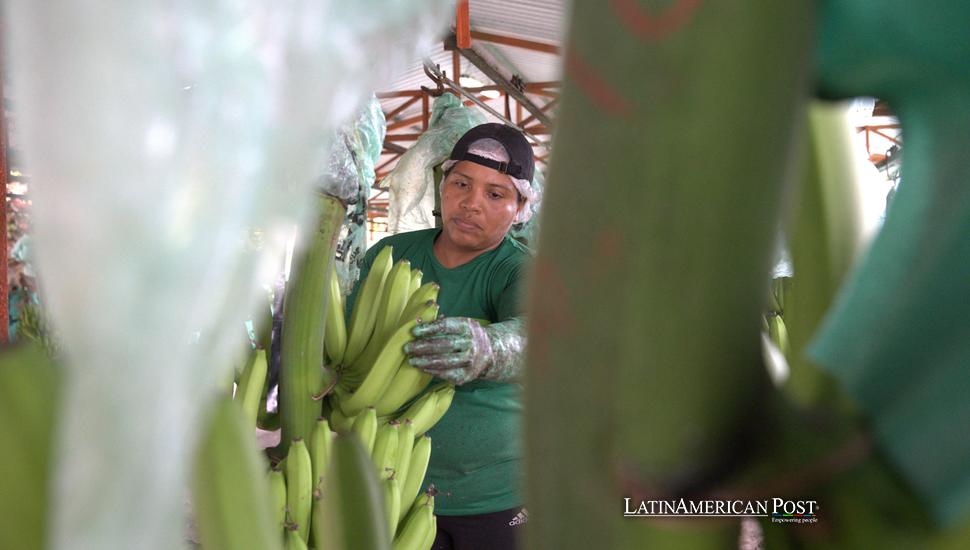Ecuador’s Banana Industry Defends Itself Amid Rising Crime Waves

As the crime and security risks for Ecuador’s banana export sector escalate, the nation has proactively developed a forward-looking security strategy to protect its exports, particularly to Europe. Drawing inspiration from the successful Colombian model, this strategy, according to company spokesmen, will provide unprecedented protection for Ecuadorian producers, instilling a sense of reassurance among stakeholders.
A Threatened Export Powerhouse
The supply chain for Ecuador’s banana industry is a major engine driving the national economy. Last year, the sector exported bananas for more than $3.5 billion. The country is the world’s largest banana exporter. This industry employs a fifth of the national agricultural workforce, accounting for half the country’s official foreign exchange earnings. The industry erupted when criminal activity spiked this summer, threatening banana producers’ operations. Ecuadorian producers joined forces to denounce extortion, kidnappings, and shipment contamination. Criminal elements behind these threats have targeted the farms where bananas are grown, harvested, and prepared for export and the main shipping routes.
In response to these threats, Ecuador’s Banana and Plantain Cluster and the country’s leading producers, transporters, and specific international experts and advisors have recently launched the ‘Fincas Seguras’ (Safe Farms) initiative. This initiative, a comprehensive security protocol inspired by Colombia’s successful experience, holds the potential to create secure production chains and trade routes, fostering a sense of optimism among stakeholders.
Protecting Farms with ‘Fincas Seguras’
The ‘Fincas Seguras’ protocol was established to protect the Ecuadorean banana industry’s entire production and export chain. It was launched by former Colombian defense minister Diego Molano at the 21st Banana Time convention in Guayaquil. Ecuador’s new security protocol focuses on prevention, coordination of actions, and commitment from the state.
These efforts equip farmers with the information and tools necessary to combat criminal activity. However, ‘Fincas Seguras’ does not depend solely on the initiatives of individual farms. It highlights the importance of collaboration among private stakeholders, industry associations, and public security officials to enhance protections across the supply chain. The emphasis on continuous cooperation between Ecuador’s banana industry and state security forces indicates an understanding that sustained security improvements require consistent support.
‘Fincas Seguras also promotes training for workers and a real-time communications network based on the principle that – if we all contribute to the solution – it will be better for all,’ he explains. ‘The initiative works to bring everybody together to share information and ideas. The race or chase will always be with us, just the nature of security. You need to stay updated.’ Fincas Seguras has put in place a system with multiple information sources that improve the ability of industry players to react to emerging threats. Communication channels within the supply chain connect on-the-ground workers with drivers and logistics providers. A vital aspect of the Colombian initiative is its focus on collaboration among local participants, deliberately excluding state forces and international entities from the sector. This approach represents an intriguing experiment that could benefit the industry throughout the region. One observer noted, “Unless we include workers in the communication chain, migrants will never feel safe, regardless of how many guards are on duty.” The approach has a broader appeal. The idea of low-tech recognition of inappropriate behavior is gaining traction as a precursor to more formal security strategies in countries such as Guatemala, Peru, and Mexico. The Agency for International Development (USAID) is now promoting the model among Colombia’s neighboring countries, which has supported much of Fincas Seguras’ anti-criminalization work.
Investing in High-Tech Monitoring and Risk Management
The ‘Fincas Seguras’ program also aims to improve security using technology, which includes biometric access systems and secure data-sharing platforms. For instance, participating farms will implement biometric technology to restrict access to production areas and loading zones, ensuring that only authorized personnel can enter these sensitive locations. The plan also envisions creating secure databases that track employees and suppliers for farms so that they can verify security backgrounds and avoid hiring staff with histories of involvement in other criminal activity.
At the center of this is the establishment of the Integrated Strategic Prevention and Security Response Centre, Ciepris. As the intelligence-gathering hub for the system, Ciepris will monitor data in real-time from farms that have joined the platform and be able to request reinforcements from the national security forces whenever security incidents need a rapid response. Ciepris, with its dual private and public inputs, represents the realization of a longstanding political objective: linking the security needs of the private sector with the capabilities of the police and military and coordinating them to jointly mitigate risks that threaten the industry.
Calls for Shared Responsibility Across the Supply Chain
Now Ecuador’s banana exporters, who provide 30 percent of their fruit to the E.U., demand that their European Union importers take on a ‘joint responsibility for the security of Ecuador’s exports,’ claiming that Europe’s dependence on bananas is also a public health issue that warrants a worldwide solution.
Ecuadorian exporters are seeking a seismic shift—for shipping containers to be scanned at the port immediately upon leaving, keeping the shipments safe from the rigors of the open sea, thieves, tampering, and terrorists.
Ecuadorian authorities are seeking to initiate dialogues with governments regarding these matters, aiming to invest in enhanced security measures along the pathway to guarantee the secure and punctual delivery of these cherished exports to the European Union.
Diego Molano reminded the audience at Banana Time that security cannot be the responsibility of individual banana companies, cities, or provinces. The initiative will require a collective effort across Ecuador’s banana industry and consistent support from Ecuador’s national security forces. Following Colombia’s success with similar problems, Molano said that Ecuador must combine public security forces and private initiatives to crush the problem. ‘The fight against organized crime in Ecuador will not be short; it will be prolonged,’ he said. ‘It will take allowing oneself to continue in spirit, muscle, and all of us coordinating together.’
Building a Safer Future for Ecuador’s Economy
The ‘Fincas Seguras’ initiative promises to become a beacon of hope for Ecuador, especially for industries grappling with significant challenges. As organized crime becomes more embedded in the economy, the proactive measures taken by the banana sector offer a much-needed glimmer of optimism for its long-term sustainability.
By enhancing security strategies within the banana industry, Ecuador can ensure the smooth export of one of its essential products — bananas — to the global market. This protects the livelihoods of those involved in the industry and reinforces the country’s position in the world economy. Suppose it all works out for the best. In that case, Ecuador will also have implemented an effective security policing mechanism that should gain the respect of international markets and help provide it with a firm step forward in tackling some of the pressing security issues of the present.
Lea también: Huachipato’s Closure and Chile’s Steel Industry Future
With support from the Ecuadorian government and the international community, the banana sector could approach these challenges and show the way forward for capital-dependent export economies by proving that innovative security approaches have the potential to support long-term growth and resilience.





